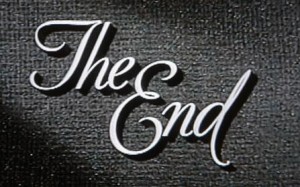Documentary filmmakers frequently encounter a dilemma: how do you know when to say, “production is over.”
You can always shoot more, especially now with video. For Grey Gardens, a film I reference frequently, the Maysles shot more than 70 hours of footage over the course of six weeks. That’s film, not video. And film stock and processing was very expensive back in 1973. It still is. Today, 70 hours of footage would be considered a paltry amount for a 90-minute film.
But expense and shooting ratio aside, the bigger question is, how do you know when you’ve shot all there is to shoot? With a documentary like Spellbound there is a built-in ending. The spelling bee competition. The winner is exalted. The losers cry. Epilogue.
 With a film like The King of Kong, though there is a contest to see who can score the most points, there is always the potential for a new record once you’ve yelled, “That’s a wrap.” (This is in fact the case with the chase for the Donkey Kong high score.)
With a film like The King of Kong, though there is a contest to see who can score the most points, there is always the potential for a new record once you’ve yelled, “That’s a wrap.” (This is in fact the case with the chase for the Donkey Kong high score.)
With A Life’s Work I can always shoot more. Stuff always happens. The ATA goes into hibernation, for example. Or the Champion Tree Project changes its name to Archangel Ancient Tree Archive and sets out on a new expedition. Or a new duct is being constructed at Arcosanti that will capture the heat from the greenhouse and passively bring it up a building on the mesa. Or the Black Gospel Restoration Project is sent a piece of vinyl on a label no has heard of before.
And then I look at footage and I think, wouldn’t it be great to have footage of Copemish, Michigan in the spring? Wouldn’t it be great to shoot the Milarchs amidst blooming trees?
But I must remind myself that A Life’s Work is not about documenting the progress of these projects. That would be futile and quite beside the point of the film. The opposite of the point, really.
So I can declare that production is over because I have the footage I want and the interviewees say things that propel the narrative. I don’t need to shoot latest developments.
But then again, wouldn’t it be nice if …
I’m sure there will be more on this topic as the edit progresses, as I come across sequences that could use a shot of ____ to really make it perfect.

Robert
Good, thoughtful questions, David. As a writer of non-fiction, especially history, I’m always facing the same thing. Right now I’m pondering would it be worth the time (and money) to go the MLK Library and Archives? What about the collection at Stanford? And there are always more surviving gospel artists, politicians, DJs, Freedom Riders I COULD interview, hoping to obtain just one more nugget of information. But, as David McHam, the legendary journalism professor once told me, “Perfection is the Enemy of Publication.” You can polish (and research) something FOREVER …
David Licata
Bob!
When I see that you’ve left a comment, I know it’s going to be good. And this one doesn’t disappoint. Such a great quote. I’m going to put that on my corkboard. Thanks so much for sharing.
And tomorrow there will be another post on this topic based on a FB exchange I had with an abstract painter.
Hope all is well with you and yours.
D.